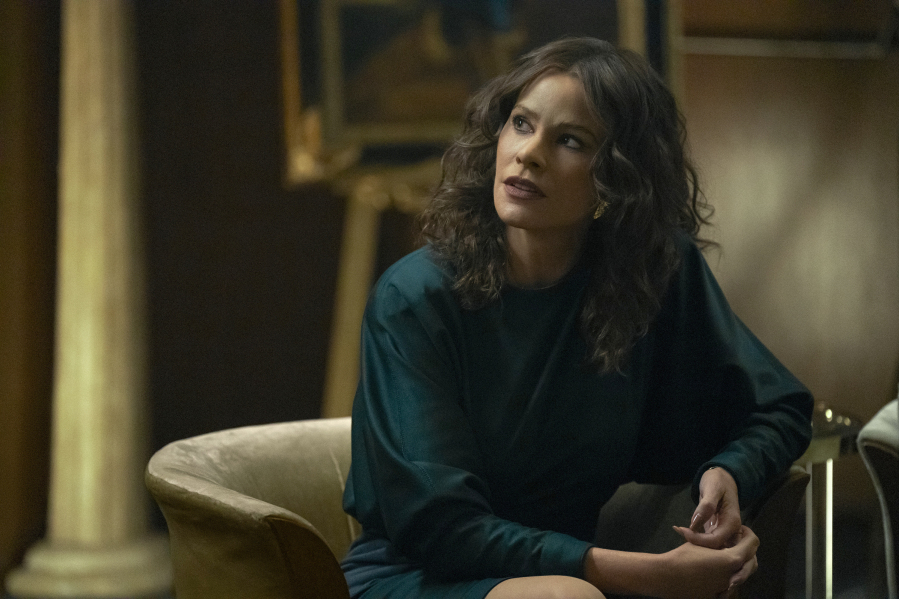In the late 1970s and early ‘80s, Colombian-born Griselda Blanco ran the cocaine trade in Miami with brutality, making her just like any other notorious crime boss. Albeit one who encountered machismo and sexism every step of the way.
The six-episode Netflix biopic series “Griselda,” starring Sofía Vergara, doesn’t celebrate her achievements so much as find them inordinately fascinating: What if Scarface were a woman? (When she picks up a gold-plated automatic rifle, high and out of her mind, you half expect the words “Say hello to my little friend” to come tumbling out.)
But a more basic question is left unanswered: Why is this story interesting?
She was known as the Cocaine Godmother, which would be a catchier title for the limited series, but Lifetime beat Netflix to the punch with a 2017 biopic starring Catherine Zeta-Jones called, you guessed it, “Cocaine Godmother.”
The real Griselda first arrived in the U.S. in the mid-1960s and her cocaine operation was originally based out of New York for about 10 years. Drug charges eventually followed and she fled back to Colombia. The series begins some time after that, with Griselda in an abusive marriage, which she escapes by making her way to Miami with her sons. In the show’s conception, she’s just doing what she can to survive, whether that means shooting a man dead or smuggling a kilo of coke with her to Miami.
Even with a fresh start potentially in front of her, she goes back to what she knows: The drug business. Despite what she says, it’s not about financial stability for her children, but about becoming the dominant figure in Miami.
This is an entirely different kind of role for Vergara, known for her Emmy-nominated role on “Modern Family,” and her performance here is compelling on those terms alone. Griselda’s charm, when she does turn it on, is strictly transactional. And it comes with a hard edge borne from experience. The violence that unfolds around her — or by her hand — may leave her momentarily reeling. But she’s never compelled to walk away. No horror is too horrifying. Her soul has already been broken. Her rise is all that matters. They say your worth isn’t determined by your career, but try telling that to Griselda. Maybe that’s why she refuses a $50 million buyout offer from the cartel. But as written, the character is an enigma. She’s a striver and an underdog who is forever underestimated, but these outward traits tell us little about her inner life. This is a woman who named her youngest son Michael Corleone and that decision alone reveals more about her state of mind, and the life she wanted for her children, than much of what’s depicted on screen.
The show is from the same creative team behind Netflix’s “Narcos” and it’s a look at Griselda’s rise — of a woman punching through the glass ceiling of the cartel — and eventual fall. She ultimately spent time in prison. All but one of her sons was murdered, before she herself was killed in 2012. She was responsible for countless other deaths, and though her story is a tragedy, it is one of her own making.
The show’s most interesting gambit is the way it establishes a through line between Griselda’s theories about the allure of cocaine and her own demise: “This is the country of dreams,” she says. “But it turns out there are people here whose dreams have already come true. And when your dreams come true, you lose something precious: The feeling that comes with something new — with the unexpected. The people I’m talking about are white. And rich. Those sons of bitches that have everything. They represent a huge untapped market no one’s ever thought to touch.”
Coke was already popular among the affluent (in 1974 the New York Times Magazine called it the “Champagne of drugs”) but by the ‘80s, when Griselda was at her peak, she had transformed into the very person she was describing. In addition to coke, she wound up chasing that now-elusive thrill at the end of a crack pipe. Paranoia followed, transforming her into a terrifying (well, more terrifying) and erratic caricature of her former self.
Standouts in the supporting cast include Alberto Guerra as Griselda’s quietly loyal bodyguard-turned-paramour, and Martín Rodriguez as yet another henchman and adviser who brings a mystical energy to his work. They exist to facilitate Griselda’s single-minded pursuit of making it to the top, where the air is thin and she’s barely able to breathe, let alone think straight.
That’s the thing about the relentless pursuit of success — it’s never enough. That’s a truism that applies across American capitalism. Or as the scholar Nate Holdren observed about the cynicism underlying this mindset: A business that is “financially unscathed at the price of other people dying is a successful organization.” Griselda embraced that nasty reality to the bitter end. Unlike most captains of industry, she paid the price for it.
‘GRISELDA’
2 stars (out of 4)
How to watch: On Netflix



